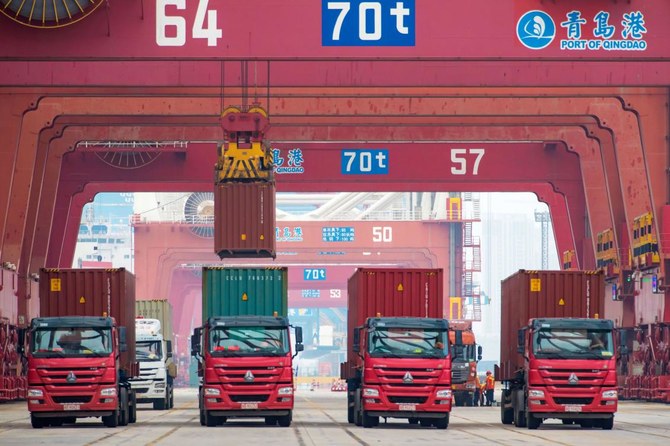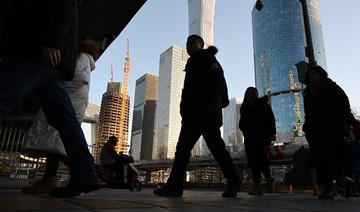BEIJING: China’s economy grew at its slowest rate in nearly three decades in the second quarter, according to an AFP survey of analysts, hit by the US-China trade war and weakening global demand.
The world’s second largest economy expanded 6.2 percent in April-June, the poll of 10 economists predicted ahead of the official release of gross domestic product figures Monday.
The reading would mark the worst quarterly growth in almost three decades but stay within the government’s target range of 6.0-6.5 percent for the whole year. The economy grew 6.6 percent in 2018.
Beijing has stepped up support for the economy this year but the moves have not been enough to offset a domestic slowdown and softening overseas demand for its toys, gadgets and electronics.
Policymakers are likely to take further action, analysts say, with Premier Li Keqiang presiding over a state council meeting Wednesday that pledged to lower tariffs and step up tax rebates for exporters.
“The existing tariffs on exports to the US are having an impact on China’s economy,” said Steven Cochrane, chief APAC economist with Moody’s Analytics.
“Industrial production and exports are also weak, with shipments to the US declining significantly,” he said.
Beijing pushed forward a raft of stimulus measures earlier this year to cushion the impact from its cooling economy, increasing spending on roads, railways and other big-ticket infrastructure projects, and tax cuts worth 2 trillion yuan ($297 billion) kicking in from April.
The policies buoyed the economy in March and brought in 6.4 percent growth for the first quarter, but it proved no more than a short-term panacea.
Industrial output surged 8.5 percent in March before tumbling in April and dropping to five percent growth in May, the slowest increase since 2002.
The build in infrastructure investment has also retreated from the first quarter, coming in at 4.0 percent in January-May, sharply down from years of near 20 percent expansion.
China’s 1.3 billion consumers have remained a bright spot.
“Consumption is holding up relatively well, possibly reflecting the effects of income and value-added tax cuts,” said Tommy Wu of Oxford Economics.
Sales of big-ticket items such as cars have not held up, though, with sales down 12.4 percent in the first half of the year, according to the China Association of Automobile Manufacturers.
Analysts widely expect Beijing will step up with further easing in coming months, with Cochrane tipping new measures heading into 2020.
“This will include lower real interest rates for small firms, further reserve requirement ratio reductions, and ongoing infrastructure spending,” he said.
The overall downward trend gives President Xi Jinping little room to fight back forcefully against the US, which is using tariffs as leverage to try to force China into opening up its economy.
Washington and Beijing have hit each other with punitive tariffs covering more than $360 billion in two-way trade and damaging manufacturers on both sides of the Pacific.
US President Donald Trump and Xi agreed to revive negotiations when they met on the sidelines of the G20 summit in Japan on June 29.
Top US and Chinese negotiators held phone talks on Tuesday but it remains unclear if the wide rupture that has formed since talks broke down in May can be patched over.
On Thursday Trump raised eyebrows with a tweet accusing China of not fulfilling a pledge to buy more agricultural goods, adding: “Hopefully they will start soon!”
Björn Giesbergen of RaboResearch said “we are currently in a stable, unstable equilibrium” with the US-China trade war.
“Ultimately we believe it will be impossible to reach a long-lasting deal. As such, the question is not if tensions will flare up again, but rather when,” he said.
China’s GDP growth seen slowing to 6.2% in second quarter
China’s GDP growth seen slowing to 6.2% in second quarter

- Beijing stepped up support for the economy but the moves have not been enough to offset a domestic slowdown and softening overseas demand
- China’s 1.3 billion consumers remain a bright spot
Open Forum Riyadh to discuss digital currency, AI, and mental health

- The event will run in parallel to the WEF’s Special Meeting on Global Collaboration
LONDON: The Open Forum Riyadh — a series of public sessions taking place in the Saudi capital on Sunday and Monday — will “spotlight global challenges and opportunities,” according to the organizers.
The event, a collaboration between the World Economic Forum and the Saudi Ministry of Economy and Planning, will run in parallel to the WEF’s Special Meeting on Global Collaboration, Growth and Energy for Development, taking place in Riyadh on April 28 and 29.
“Under Saudi Vision 2030, Riyadh has become a global capital for thought leadership, action and solutions, fostering the exchange of knowledge and innovative ideas,” Faisal F. Alibrahim, Saudi minister of economy and planning, said in a press release, adding that this year’s Open Forum being hosted in Riyadh “is a testament to the city’s growing influence and role on the international stage.”
The forum is open to the public and “aims to facilitate dialogue between thought leaders and the broader public on a range of topics, including environmental challenges, mental health, digital currencies, artificial intelligence, the role of the arts in society, modern-day entrepreneurship, and smart cities,” according to a statement.
The agenda includes sessions addressing the impact of digital currencies in the Middle East, the role of culture in public diplomacy, urban development for smart cities, and actions to enhance mental wellbeing worldwide.
The annual Open Forum was established in 2003 with the goal of enabling a broader audience to participate in the activities of the WEF, and has been hosted in several different countries, including Cambodia, India, Jordan and Vietnam.
The panels will feature government officials, artists, civil-society leaders, entrepreneurs, and CEOs of multinationals.
This year’s speakers include Yazeed A. Al-Humied, deputy governor and head of MENA investments at the Saudi Pubic Investment Fund; Princess Reema Bandar Al-Saud, Saudi Arabia’s ambassador to the US; and Princess Beatrice, founder of the Big Change Charitable Trust and a member of the British royal family.
Michele Mischler, head of Swiss public affairs and sustainability at the WEF, said in a press release that the participation of the public in Open Forum sessions “fosters diverse perspectives, enriches global dialogue, and empowers collective solutions for a more inclusive and sustainable future.”
Meituan looks to hire in Saudi Arabia, indicating food delivery expansion

SHANGHAI: Chinese food delivery giant Meituan is seeking to hire staff for at least eight positions based in Riyadh, in a sign it may be looking to Saudi Arabia to further its global expansion ambitions, according to Reuters.
The jobs ads, which is hiring for KeeTa, the brand name Meituan uses for its food delivery operations in Hong Kong, is seeking candidates with expertise in business development, user acquisition, and customer retention, according to posts seen by Reuters on Linkedin and on Middle Eastern jobs site Bayt.com.
Meituan did not immediately respond to a request for comment by Reuters on its plans for Saudi expansion.
Bloomberg reported earlier on Friday that the Beijing-based firm would make its Middle East debut with Riyadh as the first stop.
Since expanding to Hong Kong in May 2023, Meituan’s first foray outside of mainland China, speculation has persisted that its overseas march would continue as the firm searches for growth opportunities, with the Middle East rumored since last year to be one area of possible expansion.
“We are actively evaluating opportunities in other markets,“ Meituan CEO Wang Xing said during a post-earnings call with analysts last month.
“We have the tech know-how and operational know-how, so we are quietly confident we can enter a new market and find an approach that works for consumers there.”
IMF opens first MENA office in Riyadh

RIYADH: The International Monetary Fund has opened its first office the Middle East and North Africa region in Riyadh.
The office was launched during the Joint Regional Conference on Industrial Policy for Diversification, jointly organized by the IMF and the Ministry of Finance, on April 24.
The new office aims to strengthen capacity building, regional surveillance, and outreach to foster stability, growth, and regional integration, thereby promoting partnerships in the Middle East and beyond, according to the Saudi Press Agency.
Additionally, the office will facilitate closer collaboration between the IMF and regional institutions, governments, and other stakeholders, the SPA report noted, adding that the IMF expressed its appreciation to Saudi Arabia for its financial contribution aimed at enhancing capacity development in its member countries, including fragile states.
Abdoul Aziz Wane, a seasoned IMF director with an extensive understanding of the institution and a broad network of policymakers and academics worldwide, will serve as the first director of the Riyadh office.
Saudi minister to deliver keynote speech at Automechanika Riyadh conference

RIYADH: Saudi Arabia’s Deputy Minister of Investment Transaction Saleh Al-Khabti is set to deliver the keynote speech at a global automotive aftermarket industry conference in Riyadh.
Set to be held from April 30 April to May 2 in the Saudi capital’s International Convention and Exhibition Center, Automechanika Riyadh will welcome more than 340 exhibitors from over 25 countries.
Al-Khabti will make the marquee address on the first day of the event, which will also see participation from Aftab Ahmed, chief advisor for the Automotive Cluster at the National Industrial Development Centre, Ministry of Industry and Mineral Resources.
Saudi Arabia’s automotive sector is undergoing a transformation, with the Kingdom’s Public Investment Fund becoming the major shareholder in US-based electric vehicle manufacturer Lucid, and also striking a deal with Hyundai to collaborate on the construction of a $500 million-manufacturing facility.
Alongside this, Saudi Arabia’s Crown Prince Mohammed bin Salman launched the Kingdom’s first electric vehicle brand in November 2022.
Commenting on the upcoming trade show, Bilal Al-Barmawi, CEO and founder of 1st Arabia Trade Shows & Conferences, said: “It is a great honor for Automechanika Riyadh to be held under the patronage of the Saudi Arabian Ministry of Investment, and we’re grateful for their continued support as the event goes from strength-to-strength.
“The insights and support we’ve already received have been invaluable, and we look forward to continuing this relationship throughout the event and beyond.”
This edition of Automechanika Riyadh will feature seven product focus areas, including parts and components, tyres and batteries, and oils and lubricants.
Accessories and customizing, diagnostics and repairs, and body and paint will also be discussed, as well as care and wash.
Aly Hefny, show manager for Automechanika Riyadh, Messe Frankfurt Middle East, said: “The caliber of speakers confirmed to take part at Automechanika Riyadh is a testament to the event’s growth and prominence within the regional automotive market.
“We have developed a show that goes beyond the norm by providing a platform that supports knowledge sharing and networking while promoting the opportunity to engage with key industry experts and hear the latest developments, trends and innovations changing the dynamics of the automotive sector.”
Aramco-backed S-Oil expects Q2 refining margins to remain steady then trend upward

SEOUL: South Korea’s S-Oil forecast on Friday that second-quarter refining margins will be steady, supported by regular maintenance in the region, then trend upward in tandem with higher demand as the summer season gets underway, according to Reuters.
Over the January-March period, the refiner said it operated the crude distillation units at its 669,000-barrel-per-day oil refinery in the southeastern city of Ulsan at 91.9 percent of capacity, compared with 94 percent in October-December.
S-Oil, whose main shareholder is Saudi Aramco, plans to shut its No. 1 crude distillation unit sometime this year for maintenance, the company said in an earnings presentation, without specifying the time.

















